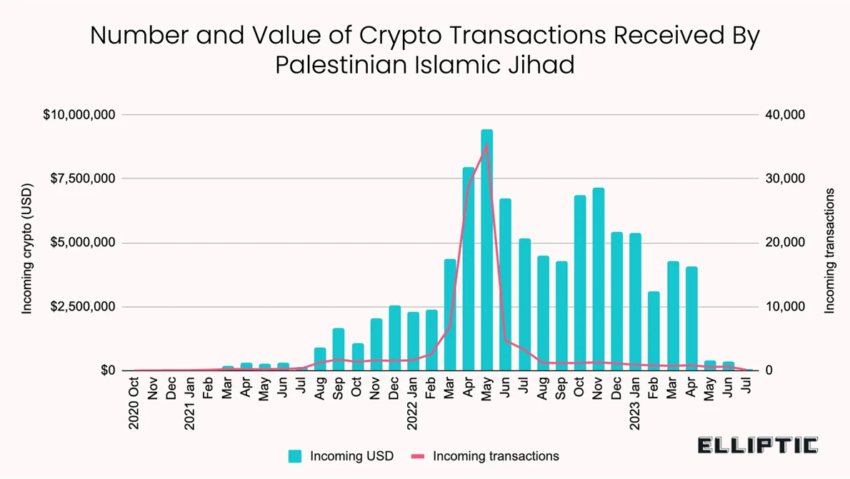In recent years, cryptos have reshaped the financial system, offering a new level of anonymity and decentralization. One unintended consequence has been exploiting this financial technology by extremist groups to further their causes.
Hamas, a militant organization recognized as a terrorist entity by many countries, is a notable example of this trend. It has been reported that this group leverages crypto to raise funds, bypassing traditional financial systems, which are heavily monitored and regulated.
Hamas Exploits Crypto for Terrorism Funding
Iran was identified as a prominent financial supporter of Hamas, providing the resources necessary for the militant activities.
“Hamas is funded, equipped, armed by Iran and others. And so, that’s why we have taken action throughout this administration to hold Iran accountable. We’ve imposed sanctions on Iran for support to Hamas and other terrorist organizations. That is going to continue,” a senior Biden administration official told journalists.
However, a diversified approach to fundraising has emerged with crypto. The decentralized and pseudonymous nature of cryptos like Bitcoin has attracted the attention of Hamas, paving a new avenue for the accumulation of funds from sympathizers worldwide.
This is a major concern of United States Senators, such as Elizabeth Warren, who are pressing Congress to advance a bill enforcing fresh anti-money laundering regulations on crypto.
“The danger of crypto-financed terrorism is real and should be an urgent priority for Congress. There’s a growing bipartisan coalition of senators who are committed to passing this bill and fighting back against terrorism worldwide by choking off the financing,” Warren said.
Read more: Crypto Regulation: What Are the Benefits and Drawbacks?
Meanwhile, the US Justice Department and global law enforcement agencies have been probing into the crypto channels that allegedly assist in money laundering for Hamas. The details of these investigations remain scant due to sealed court filings. Still, it is known that they revolve around Hamas-linked crypto accounts seized by the US government.
These findings have highlighted the operational footprint of Hamas, showcasing a significant paradigm shift in how terrorist groups manage their finances in the modern era.
Private analysts have shared that crypto addresses seized by Israeli authorities, linked to Hamas and other Palestinian militant factions, amassed tens of millions of dollars. This revelation underscores the financial magnitude at which extremist factions are exploiting cryptocurrencies.
“Hamas launched a fundraising campaign on social networks, asking the public to deposit crypto coins into its account. The cyber and foreign exchange unit worked immediately to locate and freeze the accounts, assisted by the Binance crypto exchange,” a police spokesperson said.
The digital realm extends beyond crypto for Hamas, with the organization and its affiliates utilizing different mediums to solicit donations. Public crypto wallet addresses and a growing presence on social media demonstrate a bold approach to fundraising.
“There’s not one financing method for Hamas or other terrorist organizations. They’re opportunistic and adaptive. Efforts to stop them are a constant game of cat-and-mouse,” former CIA analyst Yaya Fanusie said.
Amassing More Than $41 Million in Donations
At one point, Hamas’s military wing, al-Qassam Brigades, announced a halt in Bitcoin fundraising. This was likely a response to law enforcement agencies’ increased scrutiny and successful asset seizures. However, reports indicate that the fundraising campaigns have discreetly continued.
On-chain data suggests a significant accumulation of crypto funds by Hamas. For instance, the analytics firm Elliptic pointed out that Hamas-linked crypto addresses accumulated around $41 million between 2020 and 2023, which Israeli authorities later seized.
“The state of transactions shows a sudden drop at the end of April 2023 – coinciding almost exactly with the announcement by Hamas’ al-Qassam Brigades that it was suspending its Bitcoin donation campaign. Though the vast majority of the PIJ’s funds originate in USDT, the two events may still be related… PIJ-affiliated wallets have initiated high-volume transactions with those affiliated with Hezbollah, Hamas and numerous illicit money service businesses,” Arda Akartuna, Senior Cryptocurrency Threat Researcher at Elliptic, stated.
The utilization of crypto by Hamas reflects a broader challenge faced by global regulatory and law enforcement agencies. While revolutionary, the blockchain technology underpinning crypto presents a formidable obstacle in curbing illicit financial flows.
Read more: Crypto Project Security: A Guide to Early Threat Detection
The pseudonymous nature of blockchain transactions makes tracing the individuals behind them challenging, and Congress is urged to do something.
“The abuse of crypto by terrorist organizations should serve as a wake-up call to Congress to crack down on digital assets and money laundering that we now know is helping bankroll the horrific massacres in Israel,” Senator Roger Marshall said.
The tug-of-war between illicit actors like Hamas and law enforcement agencies is expected to intensify. As blockchain technology evolves, so does the sophistication of those wishing to exploit it for nefarious purposes. Therefore, stressing the urgent need for robust regulatory frameworks and international cooperation to curb the misuse of crypto.
The post How Hamas Leverages Crypto to Fuel Its Operations appeared first on BeInCrypto.
